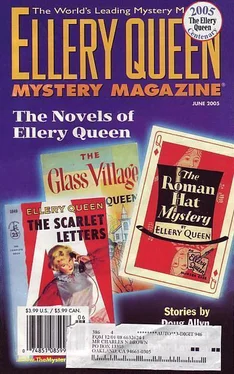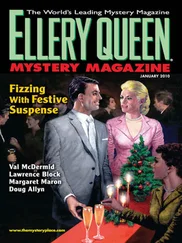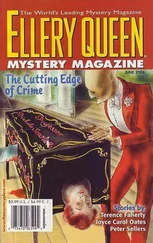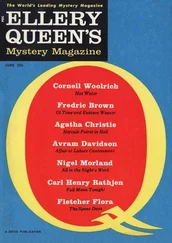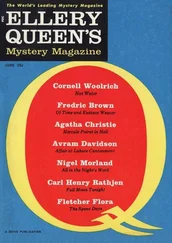Doug Allyn - Ellery Queen’s Mystery Magazine. Vol. 125, No. 6. Whole No. 766, June 2005
Здесь есть возможность читать онлайн «Doug Allyn - Ellery Queen’s Mystery Magazine. Vol. 125, No. 6. Whole No. 766, June 2005» весь текст электронной книги совершенно бесплатно (целиком полную версию без сокращений). В некоторых случаях можно слушать аудио, скачать через торрент в формате fb2 и присутствует краткое содержание. Город: New York, Год выпуска: 2005, ISBN: 2005, Издательство: Dell Magazines, Жанр: Детектив, на английском языке. Описание произведения, (предисловие) а так же отзывы посетителей доступны на портале библиотеки ЛибКат.
- Название:Ellery Queen’s Mystery Magazine. Vol. 125, No. 6. Whole No. 766, June 2005
- Автор:
- Издательство:Dell Magazines
- Жанр:
- Год:2005
- Город:New York
- ISBN:ISSN 1054-8122
- Рейтинг книги:3 / 5. Голосов: 1
-
Избранное:Добавить в избранное
- Отзывы:
-
Ваша оценка:
- 60
- 1
- 2
- 3
- 4
- 5
Ellery Queen’s Mystery Magazine. Vol. 125, No. 6. Whole No. 766, June 2005: краткое содержание, описание и аннотация
Предлагаем к чтению аннотацию, описание, краткое содержание или предисловие (зависит от того, что написал сам автор книги «Ellery Queen’s Mystery Magazine. Vol. 125, No. 6. Whole No. 766, June 2005»). Если вы не нашли необходимую информацию о книге — напишите в комментариях, мы постараемся отыскать её.
Ellery Queen’s Mystery Magazine. Vol. 125, No. 6. Whole No. 766, June 2005 — читать онлайн бесплатно полную книгу (весь текст) целиком
Ниже представлен текст книги, разбитый по страницам. Система сохранения места последней прочитанной страницы, позволяет с удобством читать онлайн бесплатно книгу «Ellery Queen’s Mystery Magazine. Vol. 125, No. 6. Whole No. 766, June 2005», без необходимости каждый раз заново искать на чём Вы остановились. Поставьте закладку, и сможете в любой момент перейти на страницу, на которой закончили чтение.
Интервал:
Закладка:
Chundira rambled on. “Mark Lungu is the obvious one, though.”
“Why would Mark Lungu take the risk instead of sending one of his rebels?”
“He’s not that sort of man. He’s a man of action.”
Again, Kachani was sure his boss’s speculations were based on nothing but hearsay. He reached out and his fingers sandwiched the knob of the car radio.
There was a large crowd outside the palace. They had probably been there since the night before. Once-jubilant faces were now showing signs of exhaustion. Their voices, still screaming and chanting, were now raw and hoarse. Still, they remained gathered — almost as though they feared it was a dream and if they went back to their houses, they would wake to find Ebeso alive. Patrick mentioned that it had been hard to stop the crowds from rushing the palace the day before. Now, policemen stood lazily in front of the residence’s gates watching the mollified masses. There was still some life in the weary multitude. It was localised around one man who stood on a makeshift podium of upside-down crates. He gesticulated ferociously as he shouted.
“Who’s that, some community leader?”
Chundira didn’t know, either.
They entered the palace. It was huge — excessively so. Eleven years earlier, when Ebeso had come into power, he had felt that the old presidential residence in Lilongwe was an inadequate representation of his heroism. He had demanded that a palace “of heroic proportions” be built for him. He inspected the plans drawn up by several architects and ordered them executed for insulting his magnificence. Eventually, one architect satisfied him and the Blantyre palace was built. It had cost more than Malawi’s annual domestic budget. It stretched out over twenty-one acres and had twelve floors and elevators on opposite sides. The ceilings were high, and elaborate crystal chandeliers hung from them. The corridors were long and paved with ornate carpets that reminded Kachani of the wares of Mrs. Patel’s Carpet Nirvana. Every few meters there was a tribute to Ebeso’s magnificence: paintings and photographs of the dictator, wooden carvings of lions, and a large mirror (in front of which he would undoubtedly pose).
“Didn’t the man ever get tired of looking at himself?” Patrick mused.
Kachani stopped to look at a nine-foot-tall portrait. Ebeso was always taller, thinner, and more handsome in his portraits. This one barely looked like him. He was identifiable only because of the array of medals for valor pinned to his chest. Ebeso had awarded them to himself. Military might had been essential in Ebeso’s vision of Malawi, even though it had never been at war with another African country. It had no raw materials to be coveted, and its land mass was sparse. Hardly worth the effort of invasion. But then again, Kachani considered, how many African countries have ever been at war with another country? Still, all of them spend money and resources on the military. The armies, of course, never go to waste. They are inevitably used on the domestic population.
The bathroom was at the far end of the corridor, a bald policeman standing outside it chewing gum noisily. Like everything else in the residence, the bathroom was huge. It had four stalls and the tiles on the floor were a mosaic of a lion. The image was barely visible now because the floor was covered in a layer of grime. “Did you let every policeman in Blantyre in here to contaminate the evidence?”
“No,” Chundira defended himself. “Ebeso had one of his big parties two nights ago.”
Everybody who had attended that party, every guard who used to patrol the palace, and everyone else remotely linked to Ebeso had probably fled the country by now. The few followers of Ebeso who had been found by the mobs the night before had been beaten to death. Kachani walked about the bathroom taking meticulous note of everything he saw: three sinks, three urinals, a mop in a bucket, a large fan in the roof, a portrait of Ebeso on the wall... By the time he had made a complete survey, he was disheartened. Even with her bias, the Malawi News reporter had been very accurate. “I need to speak to the man who found the body,” he told Patrick. “Did he leave his address?”
“He’s right outside, sir,” said the bald policeman.
“Great. Can you get him?”
A nod and a brisk march down the corridor followed.
“He’s actually military,” said Chundira, pointing at his back. “We didn’t have enough police to keep control yesterday so we gave some soldiers police uniforms. Couldn’t have them in military uniforms because of the stigma.”
Kachani barely heard him. He was looking intently down the corridor himself.
“What is it?”
“Maybe nothing,” replied Kachani.
The man who had found Ebeso’s body was brought back in a few minutes. It was the man they had seen giving a speech outside. His suit was immeasurably old, with split seams about the shoulders and numerous stains. It was draped over his skinny body like a tarpaulin. He had a veritable glow about him; his smile was huge and his head was held aloft. “I am Arthur Ntaso.”
“You found him?”
“Yes,” was the proud reply. “I was mopping upstairs when I heard a loud bang. It was like thunder. It made my body shake. I know now that it was the sound of God’s vengeance. I ran downstairs, and when I got here I found him gasping for his life. He was holding his wound and coughing blood. As he was dying he held out his hand and said, ‘Forgive me, Malawi.’ I told him, ‘It is too late for you.’”
Kachani stifled a smile. Mr. Ntaso was obviously embellishing to make himself out to be a hero. Who could blame him? Here was a man who had probably been a servant all his life. Serendipity had suddenly placed him at the center of attention and he loved it. The untruths in his story were obvious. Even from looking at the photograph in the newspaper Kachani knew that Ebeso’s hands had not been bloody. And the notion of Ebeso begging Malawi for forgiveness was laughable. Kachani kept these thoughts to himself. He could get the information he needed without tearing away Mr. Ntaso’s moment of glory.
“Could you show me where you were when you heard the gunshot?”
Ntaso took Kachani and Patrick up a short flight of stairs. “Here. Just outside his study.”
“And you ran?”
“As fast as I could.”
“You didn’t see the killer?”
“No, the instrument of God’s fury was already gone by the time I got there.”
Kachani had a few more questions and then he made for the car.
“That was a waste of time,” grumbled Patrick.
“Why do you say that?”
“He was obviously lying.”
“I know, but he still helped. Now, to the two suspects.”
“You mean three?”
“Two,” he insisted. “As much as Mr. Ntaso was adding to the story, you can be sure that if he had seen the killer he would have told us about it. He may have added a few things like a halo glowing around the killer’s head, but he would have mentioned it. You saw how long the corridor was? The killer ran all the way down it in the time that Mr. Ntaso took to run down the stairs. With Zikomo’s limp, he couldn’t have run that fast.”
Chundira opened his mouth, then shut it. “You’re right.”
Kachani smiled with satisfaction, then added, “St. Paul’s Church is ten minutes away.”
When Kachani was younger, he had been deeply religious. A crucifix had dangled from his neck and a Gideon’s Bible in his back pocket had frequently been consulted. His religious and political disillusionment had occurred simultaneously. After Malawi’s first dictator, Kamuzu Banda, had been removed from power, Kachani had been one of the most hopeful. He had praised God and thrown himself into trying to serve his people as a policeman. But in the face of poverty, AIDS, and harsh droughts, none of the presidents who followed Kamuzu helped Malawi. Neither had God.
Читать дальшеИнтервал:
Закладка:
Похожие книги на «Ellery Queen’s Mystery Magazine. Vol. 125, No. 6. Whole No. 766, June 2005»
Представляем Вашему вниманию похожие книги на «Ellery Queen’s Mystery Magazine. Vol. 125, No. 6. Whole No. 766, June 2005» списком для выбора. Мы отобрали схожую по названию и смыслу литературу в надежде предоставить читателям больше вариантов отыскать новые, интересные, ещё непрочитанные произведения.
Обсуждение, отзывы о книге «Ellery Queen’s Mystery Magazine. Vol. 125, No. 6. Whole No. 766, June 2005» и просто собственные мнения читателей. Оставьте ваши комментарии, напишите, что Вы думаете о произведении, его смысле или главных героях. Укажите что конкретно понравилось, а что нет, и почему Вы так считаете.
